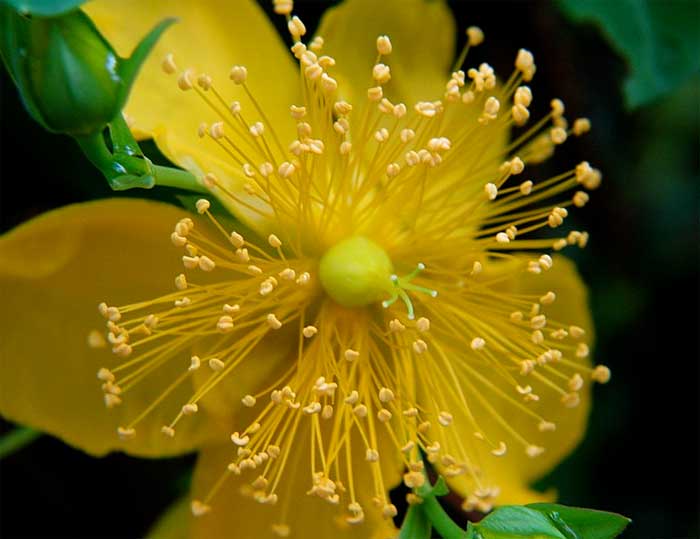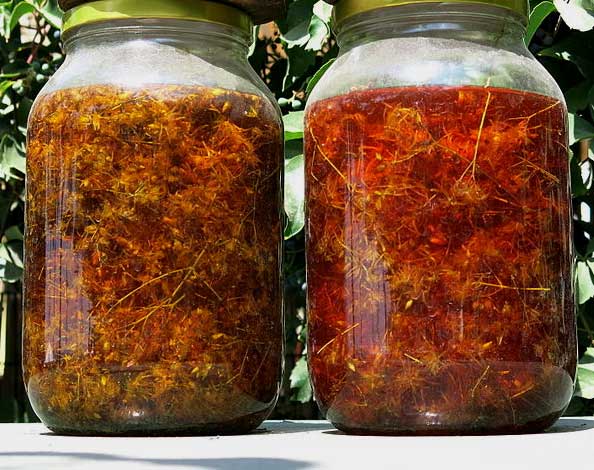St. John's Wort in herbal medicine
St. John's Wort is the top herb for curing depression.
St. John's Wort (Hypericum Perforatum) is considered by many herbalists to be nature's nerve pill. St. John's Wort helps the body deal with depression by activating secretions of dopamine, the pleasure hormone.

St. John's Wort is uplifting. It is an excellent treatment for depression, anxiety, tension, and nervous conditions. The herb is known to help mood swings and can bring peaceful feelings. Read more about treating depression with herbs.
St. John’s Wort can sometimes be useful for chronic conditions where nervous exhaustion is a factor including hysteria and insomnia.
This herb is also good for treating bruises, varicose veins, and sunburn. St. John’s Wort is also used to sooth ear infections and to treat skin pigmentation diseases.

This St. John's Wort blossom is the size of you thumbnail.
St. John’s Wort has a complex chemical makeup.
Besides activating "pleasure" hormones, St. John's Wort contains compounds that mildly inhibit the enzyme monoamine oxidase. MAO is responsible for the breakdown of brain chemicals including serotonin, another feel-good chemical.
By inhibiting MAO, St. John’s Wort helps slow the breakdown of serotonin. This chemical reaction in the brains helps depressed people to feel better.
There are cautions to consider when using St. John's Wort so do your homework before taking the herb, and never take St. John's Wort while pregnant. Find out more about St. John's Wort and dangerous prescription drug interactions at the Mayo Clinic website.
Give it six weeks and avoid certain foods.
When using St. John’s Wort for depression or anxiety disorders, it may take up to six weeks before significant improvement is noticed. Always take St. John’s Wort close to meal time and avoid taking it with red wine, cheese, yeast breads, or pickled herring.
Taking St. John's Wort internally.
Taken internally, St. John’s Wort delivers a sedative and pain reducing effect. The plant’s leaves, stems, and flowers are used in herbal teas, tinctures, powders, and capsules.
Using St. John's Wort externally
When used in lotion form and applied externally, St. John’s Wort can help a range of skin problems. St. John's Wort is made into oils, lotions, and creams for external applications.
Use St. John's Wort flower oil for burns.
St. John’s Wort flower tops are often steeped in walnut oil for a few weeks and then used as a treatment for burns and inflamed skin. The infused oil will turn blood-red due to properties in the blossoms.

St. John's Wort history
In ancient Greece, St. John’s Wort was believed to cure poisonous snake bites and was very popular for treating wounds and burns.
St. John’s Wort was used as a folk remedy in cases of kidney and lung ailments for many centuries.
St. John’s Wort was used by the American Indians to induce spontaneous abortion.
The herb was burned on St. John’s Day to protect people from goblins and devils. Its yellow flowers, which release a crimson juice when crushed, became a symbol of the blood of St. John.
St. John's Wort plants have toxic properties.
Many countries consider the plant a nuisance due to its toxic properties. Ingestion by livestock can cause photosensitization, central nervous system damage, spontaneous abortion, and can lead to death.
Some research shows that St John's Wort may have negative effects on fertility in both men and women. Never take herbal remedies without doing plenty of research.
Growing St. John's Wort
St. John’s Wort is a weedy looking plant. It grows wild in Europe and the U.S. It is especially abundant in Northern California and Southern Oregon.
Harvest plants in the summer for herbal use.
St. John's Wort, an herbal medicine for overwhelmed people
Herbalist Yarrow Willard, also known as Herbal Jedi, shows us more about St. John's Wort in this video.
*St. John’s Wort may cause sun sensitivity. This herb may cause contact dermatitis in some individuals. St. John’s Wort is toxic in large doses. Avoid St. John’s Wort when taking other anti-depressant drugs. Never use St. John’s Wort during pregnancy. Do not use essential oils in pregnancy without consulting a healthcare professional.
Always consult with your doctor before using any herbal remedies especially if taking Prozac or other prescription drugs, nursing, or if you are pregnant.
Sources:
https://www.mountsinai.org/health-library/herb/st-johns-wort
Blessings to you and yours!
Thanks so much for reading my blog. Jan.

*Note - the information on this website has not been evaluated by the Food and Drug Administration.
© 2005-2024 website design and content by Janice Boling